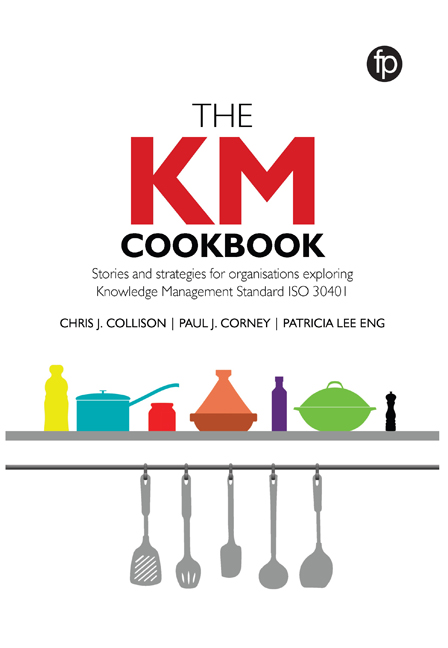 The KM Cookbook
The KM Cookbook Book contents
- Frontmatter
- Contents
- List of illustrations
- Introduction
- About the Book
- Explaining the Metaphor
- Part I A New Way to Cook?
- Part II Menus to Savour
- The Americas
- Europe
- Middle East
- Asia
- KM in Mergers and Acquisitions – Take-Away Chapter
- Endings and beginnings
- Appendices
- Interview questions
- The restaurant critic (Chapter 7)
- Knowledge Management in Schlumberger (Chapter 13)
- Transport for London (Chapter 17)
- Saudi Aramco (Chapter 23)
- MAPNA (Chapter 24)
- Index
The restaurant critic (Chapter 7)
from Appendices
Published online by Cambridge University Press: 02 October 2019
- Frontmatter
- Contents
- List of illustrations
- Introduction
- About the Book
- Explaining the Metaphor
- Part I A New Way to Cook?
- Part II Menus to Savour
- The Americas
- Europe
- Middle East
- Asia
- KM in Mergers and Acquisitions – Take-Away Chapter
- Endings and beginnings
- Appendices
- Interview questions
- The restaurant critic (Chapter 7)
- Knowledge Management in Schlumberger (Chapter 13)
- Transport for London (Chapter 17)
- Saudi Aramco (Chapter 23)
- MAPNA (Chapter 24)
- Index
Summary
Preparing for an audit – tips from the field from Patricia Lee Eng
During preparation of this book, we sought out people who have been audited many times over the past three decades and asked them how they prepare for an in-depth audit. Although they have experience with system-wide audits, programme audits and licensing or certification audits, their preparation for each type of audit was the same. This appendix contains their tips and suggestions.
Ideally, staff should work in such a way that what they are doing every day is always auditable. Being ready for an audit, in theory, should be the same as doing the job and doing it well. It helps if key staff keep unofficial current copies of records handy, even if not required to do so, for quick reference when needed, particularly if retrieval normally takes time. All of this assumes that you know about the audit in advance. Even so, if you are subject to a surprise audit you can do some of these things.
The goal is to make it as easy as possible for the audit team to examine your programme and for your staff to assist the audit team. While audits can be stressful, there is value in them. Just as a restaurant critic identifies great service but bad food, the audit team will help you identify programme strengths and weaknesses, ultimately improving the overall programme. Think of it as an assist visit.
1 Before the audit team arrives
Documentation
For audits that are announced ahead of time, the audit team often provides the organisation with a list of documents they wish to review before they arrive on site. Review and compile their requested list of documents and see if you can anticipate additional documents which they may also want to see. Just provide the documents they request but be ready to provide the additional documents as the audit progresses. The organisation should be careful not to appear ‘too eager’ but being prepared will make the organisation look responsive, which is always appreciated.
If you know the specific area being audited, try to anticipate what records the auditors will want to review. ISO 30401 calls out required documentation.
- Type
- Chapter
- Information
- The KM CookbookStories and strategies for organisations exploring Knowledge Management Standard ISO 30401, pp. 247 - 251Publisher: FacetPrint publication year: 2019


